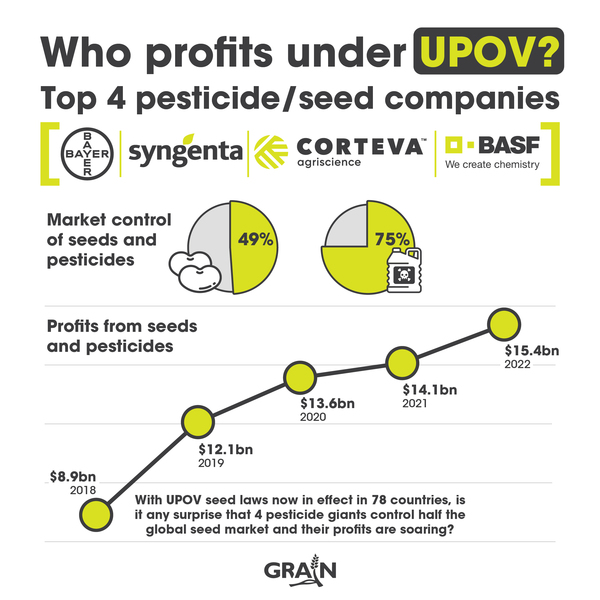“Can a business without intellectual property protection be sustainable? Preferred tool: UPOV” (Michael Keller, secretary general at the International Seed Federation).[1]
The tremendous wealth and diversity of seeds the world has today is the result of generations of saving, sharing and collective innovation by farmers. These farmer seed systems still provide for 70 to 90% of what is planted every year in many parts of the global South. But they are under threat. Corporations cannot make money from seeds when farmers are free to save, share and innovate with them. So, ever since the world's largest agrochemical corporations began buying up seed companies in the 1980s and developing genetically modified crops, they have been aggressively pushing for laws to give them monopoly rights over seeds and to criminalise farmer seed practices.
Perhaps the most important tool in their arsenal is UPOV-- a legal regime of monopoly rights over plant varieties administered by an intergovernmental body based in Geneva, called the International Union for the Protection of New Varieties of Plants. UPOV was initiated in 1961 by European seed breeders and remained largely confined to countries of the global North until the mid 1990s when seed corporations successfully lobbied governments to give up sovereignty over their seeds and give in to the system of monopoly rights on plant varieties through the World Trade Organisation (WTO). Although the WTO never specified that its member countries adhere to UPOV, the regime and its rules were subsequently imposed by industrialised countries on the global South through trade agreements negotiated outside the WTO. As a result, the number of UPOV member countries has ballooned to 78, while UPOV itself has been revised to require even greater restrictions on farmer seed saving and sharing.
As UPOV has expanded, the global seed market has been taken over by a cartel of agrochemical companies. Today, just four of these companies -- Bayer (19%), Corteva (18%), Syngenta (8%) and BASF (4%)-- control half (49%) of the US$47 billion seed market. They also control 75% of the global agrochemicals market. This is not a coincidence. These companies focus on sales of commercial seeds bred to depend on the heavy use of agrochemicals and their genetically modified seeds now account for nearly half (46%) of all global seed sales.
The logical result of this concentrated, legally-backed corporate power is an exponential rise in corporate profits. With their monopoly power, and the criminalisation of alternatives, the agrochemical giants are free to increase their prices and squeeze farmers. Over the past 5 years, their revenues and profits from the sales of seeds and agrochemicals have soared, with profits from both nearly doubling over this period.


Seed and agrochemicals profits (EBITDA) for Bayer, Syngenta, Corteva, BASF
Data from S&P Capital IQ, company financial reports
All figures in US$ billions, with conversions from company releases done on date of filings (converter used: https://www.xe.com)
Forecast for 2022 based in companies reports and Fitch Rating (in the case of Syngenta Group)
Figures for Syngenta in 2018 and 2019 relate to Syngenta AG and from 2020 to 2021 relate to Syngenta Group
Data from S&P Capital IQ, company financial reports
All figures in US$ billions, with conversions from company releases done on date of filings (converter used: https://www.xe.com)
Forecast for 2022 based in companies reports and Fitch Rating (in the case of Syngenta Group)
Figures for Syngenta in 2018 and 2019 relate to Syngenta AG and from 2020 to 2021 relate to Syngenta Group
Last year, 230 farmers' groups and civil society organisations from 47 countries came together to oppose the corporate hijack of seed systems by launching a Stop UPOV Campaign. They are calling for UPOV to be dismantled because it prohibits the free saving, breeding, sharing and distribution of seeds and undermines the diverse farmer seed systems we need to tackle the climate and food crises. In 2022, the campaign will convene again in a Week of Global Action from 28 November to 2 December. Seeds do need protection, but protection from greedy chemical corporations, not from farmers caring for them in the same ways they have done for generations.
[1]Michael Keller, “International Seed Federation perspective”, presentation at the UPOV “Seminar on the role of plant breeding and plant variety protection in enabling agriculture to mitigate and adapt to climate change”, 5 October 2022.